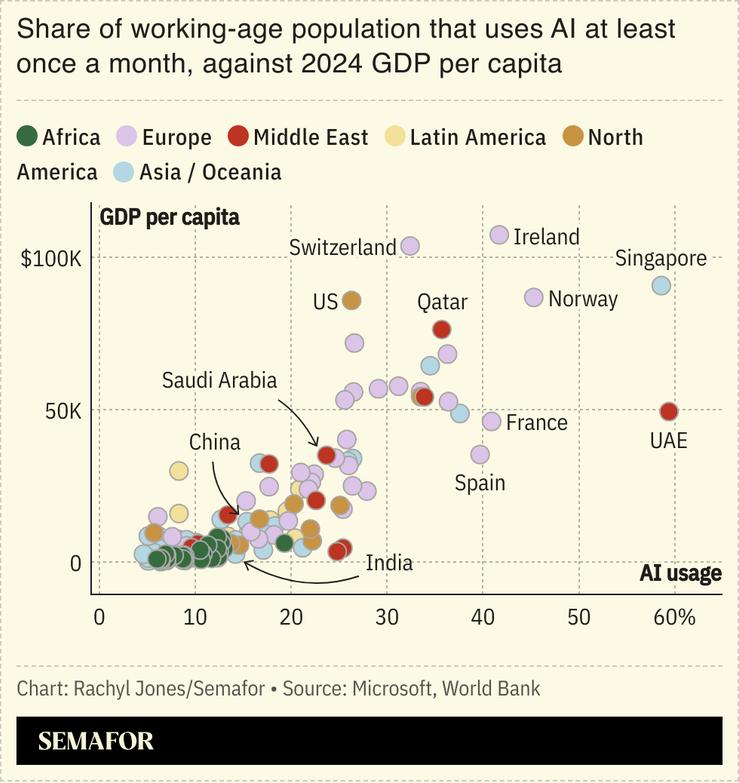Tareq’s view
Large private sector investments into the UAE’s AI ecosystem — notably Microsoft’s $15.2 billion announcement this week — are validating years of deliberate state planning. What began eight years ago with the country’s appointment of an AI minister, dismissed by many as a PR stunt, has become the norm for many nations. And the UAE is building on the early momentum.
The UAE has gone all-in on AI. There is a nuance in how Abu Dhabi sees the technology. To the Emirates, this is not a sector or opportunity: AI is being treated as critical infrastructure that enables the state to compete with others that outclass it.
The results of the Emirati strategy are showing. Already, on the individual level, the UAE is leading globally in terms of AI diffusion, with more than 59% of working-age adults utilizing AI. But usage is only part of the equation. The more critical competition is in IT infrastructure, data centers, and power capacity that have allowed the country to take the regional lead. The UAE hosts more data centers than Israel.
While many countries have the capital and power to build data centers, it’s harder to match the subtle factors that have given the UAE an advantage: few can replicate the Emirati government’s AI policy and investment experience. The UAE is no longer an AI customer — it has developed expertise in designing the ecosystems that enable the public-private partnerships necessary for AI.

The country is planning a 5-gigawatt campus in partnership with the US, a project endorsed by President Donald Trump during his visit in May. Abu Dhabi’s AI conglomerate G42 has already broken ground on the first phase of its 1-gigawatt Stargate UAE data center within the campus, alongside partners Cisco, Nvidia, OpenAI, Oracle, and SoftBank.
Microsoft is a key partner in developing the industry. This week, the company said it had received regulatory approval to ship chips to the UAE, part of the tech giant’s $15.2 billion planned investment in the Emirati economy through 2029. Already, almost $7 billion has been deployed. The company also pledged to train a million residents in AI by 2027, as well as establish a regional research and model development center.
Attracting investment at such a scale from multinational firms is notable. By comparison, Microsoft has pledged just $4.3 billion in AI investments to France and $3.5 billion to Germany.
Abu Dhabi has so far succeeded in the first phase of the AI race: it has become a global capital for the technology, and both a source of and destination for investment. The next challenge for the state is to effectively integrate the technology and start competing in innovation and invention. How well it performs the latter will determine whether the UAE can become a global AI power.
Tareq Alotaiba is a Fellow at the Belfer Center in Harvard University. He has 12 years of experience in economic policy, foreign affairs, and national security with the Abu Dhabi and UAE Federal governments. An Abu Dhabi native, he is currently pursuing a master’s degree in Security Studies at Georgetown University.
Notable
- Microsoft pledged to spend billions in the UAE through 2029 on cloud computing and chips, Bloomberg reported.
- HUMAIN, the AI company established this year by the Saudi sovereign wealth fund, plans to make the kingdom the third largest AI infrastructure provider after the US and China.


